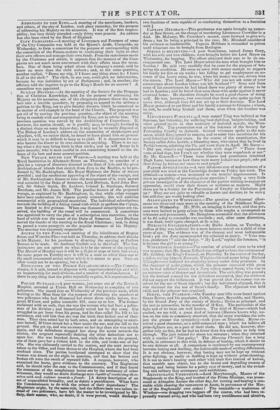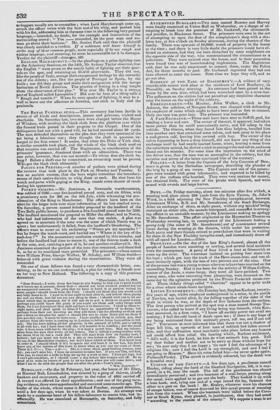POLICE OUTRAGE.—A poor woman, just come out of the Borough
Hospital, attended at Union Hall on Wednesday to complain of two policemen. She stated that on Wednesday of the previous week, while waiting at the Mint Gate for the purpose of obtaining the numbers of two policemen who had ill-treated her about three weeks before, Ser- geant M'Craw, and police constable 161, came up to her. The former exclaimed with an oath, that she was the woman who had hurt a police- man of his division ; and immediately seized her by the arms. She struggled to get loose from his grasp, and he then called No. 161 to his assistance, and told him that she was the bitch that kicked one of their men. They then seized her by both arms, and on attempting to extri- cate herself, Ill'Craw struck her a blow under the ear, and she fell to the ground. She got up, and was no sooner on her legs than she was struck again, and the defendants dragged her along the street towards the station, the sergeant repeatedly desiring the other defendant not to spare her. She was knocked down, and while she was on the ground, one of them gave her a violent kick in the side, and broke one of her ribs. She was ultimately carried to the station, and the next morning taken to the Office, and from thence to the Hospital, where she had been confined since. The parties inculpated attempted to show that the woman was drunk on the night in question, and that her bruises and broken rib were the result of repeated falls. A surgeon, however, who examined the hurts, gave evidence to the contrary. The Magistrate said, he should refer the case to the Commissioners, and if they found the statement of the complainant borne out by the testimony of other witnesses, they would no doubt discharge men capable of conducting them- selves with such violence towards a female. [A dainty description of an act of unparalleled brutality, and as dainty a punishment. What have the Commissioners to do with the crimes of their dependants ? The Magistrate might, by the same rule, had the fellows been two tailors in- stead of two policemen, have left the matter to be investigated by Mr. ;Snip, their master, who, no doubt, if it were proved, would discharge t‘niti
vofractions of men capable of so conducting themselves to a feminine
u CAPTAIN IIELSHABL—This gentleman was again'brought up yester- day at Bow Street, on the charge of murdering Lieutenant Crowther in a duel. Mr. Maloney, Mr. Crowther's second, came forward to give evi- deuce ; but he being a principal in the case, Mr. Minshull considered his evidence as inadmissible. Captain Helsham is remanded to prisoft until witnesses can be brought from Boulogne. SEEING Is BELIEVING.—A poor Scotchman, named James Grey, with his wife and two children, were brought before the Lord Mayor on Wednesday, for begging. The officer admitted their case to be an un- exaggerated one. The Lord Mayor asked the man what brought hith to London ? He said very candidly that he came for the purpose of bet-
tering his condition. He came to town with money enough to support his family for five or six weeks ; but failing to get employment on ac- count of the heavy rains, he was, when his money was out, driven into the streets. The Lord Mayor—" Why did you not ask some of your countrymen about London before you left Scotland ? " Grey said from some of his countrymen he had heard there was plenty of money to be had in London ; and he found that even those who spoke against it never returned home. He therefore thought he stood a good chance of doing well. He was, however, row convinced that those who spoke against it
spoke true, although they did not act up to their doctrine. The Lord Mayor promised to get Grey and his family a passage to Glasgow ; where, he said, he could keep himself and them, even when the weather was • rainy. INDUSTRIOUS PURSUITS —Aman named King was indicted at the Sessions, last Saturday, for suffering bear-fighting, badger-baiting, and
ether genteel sports at that seminary of national morals, the West- minster Pit. The prosecution was at the instance of the Society for Preventing Cruelty to Animals. Several witnesses spoke to the nui- sance, which King agreed to remove, and to enter into securities for his good behaviour for four years. In the course of the examination, the Society called John Lovett, a labouring man, who stated that he lived. in Perkin's-rents, adjoining the Pit, and went there in April. Mr. Barry- " Did you observe any vagabonds there with dogs ?" " There were some as had dogs, but I can't say whether they were wagabonds or not." By Mr. Creswell— " There were thieves and prostitutes inhabited Duck Lane, because as how there were many industrious people, who god their living by letting oul rooms to such people."
PARISH APPRENTICES.—A very infamous case of maltreatment of a poor child was tried at the Cambridge Assizes on Friday last week. The criminal—a woman—was sentenced to six months' imprisonment. Is
there no possibility of preventing these atrocities ? Surely a very little private investigation of the character of the parties wishing to engage an apprentice, would show their fitness or unfitness as masters. Might there not be a Society for the Prevention of Cruelty to Christians got up ? They are not quite so valuable as horses and donkies, to be sure ; but still they are worth looking after.
ALLOWANCES TO WurxEssEs.—The question of witnesses allow- ances was discussed once more at the meeting of the Middlesex Magis- trates on 'Wednesday. Mr. Mills, on bringing it forward, said that per.. sons were incited to petty crimes by those who sought a recompense as witnesses and prosecutors. Mr. Broughton contended that the allowance of Is. 6d. a-day to constables was too little ; and, after some discussion, it was fixed, until again changed, at 2s. a-day. 1lIEncrrur. Co NSIDERATION s.—At Bucks Assizes, on Tuesday, a ruffian of fifty was indicted for a most heinous assault on a child of nine
years of age. The evidence was of the clearest and most indiSputable kind ; yet the Jury recommended the criminal to mercy. " Your rea- son, gentlemen ? " said the Judge. " My Lord," replied the foreman, "it is because the girl is so young ! "
WINCHESTER ASSIZE s.—The number of criminal cases to be tried was so great, that Mr. Baron Bolland was obliged to have the assistance of
Mr. Erskine, the King's Counsel, on Thursday. In the course of the day, a fellow styling himself Botiverie Wright—his real name being Richard Whimple—was indicted for obtaining money under false pretences. In the character of a clergyman, which the prisoner sustained with great art, he had solicited money for a Navy officer named Stent, who was in. au extreme state of distress and decrepitude. The swindling was proved; but the learned counsel for the defendant contended, that the evidence did not support the indictment. It was proved that the money was re- ceived for the use of Stout himself ; 'out the indictment charged, that it was obtained for the use of Stoat's family. The objection was held valid, and the prisoner was acquitted.
BYRNE, TILE PUGILIST.—On Tuesday true bills were found against Simon Byrne, and his associates, Cribb, Cooper, Reynolds, and Martin,
by the Grand Jury of the county of Bucks ; Byrne as principal, and the rest as accessories, in the murder of M'Kay. The particulars of the fight and of its issue are well known. The trial of Byrne—which had excited, we are told, a great deal of interest (Heaven knows why, un-
less on the rule so commonly observed, that the more worthless the sub- ject the greater the sympathy)—took place on Thursday. Byrne re-
ceived a good character, as a mild-tempered man ; which we believe all prize-fighters are, as a part of their trade. He did not, however, alto- gether rely on this, for he had no fewer than five solicitors to help him through. The jury retired for about ten minutes ; when they returned with a verdict of " Not guilty." The Morning Chronicle has a long article, in reference to this trial, in defence of boxing, which it denies to be any defence at all. A comparison is instituted by our contemporary between boxing and duelling, the fashionable mode of settling differences. It is not obvious, however, that boxing may not be kept up without prize-fighting, as easily as duelling is kept up without prize-shooting. It is not to men's beating each other with their fists instead of knives, that sensible men object, but to the brutal and degrading custom of beating and being beaten for a paltry sum of money, and to the swind- ling and robbery that accompany such exhibitions.
ARISTOCRATIC UNBENDING.—Lord Maryborough, Master of the Staghounds to the King, and brother of the Prime Minister, was prose-
cuted at Abingdon Assizes the other day, for cursing and beating a con-
stable while clearing the racecourse at Ascot, in pursuance of the Mas- ter of the Staghounds' own orders ! The constable—a tradesman of
Windsor—was dragging two beggars off the course, who had been re- peatedly warned away, and who had been very troublesome and abusive,
as beggars usually are to constables ; when Lord Maryborough came up, struck the officer twice with the butt end of his whip, and pushed him with his fist, addressing him at thesame time in the following very genteel language,—intended, no doubt, for the example and instruction of the surrounding crowd : " You ---- scoundrel, let the poor man and wo- man go about their business." Mr. Justice Park said that the plaintiff was clearly entitled to a verdict. if a' nobleman will lower himself to strike any of these common people, more especially if he use rough and violent language, and swearing, he must be answerable for it in damages. Verdict for the plaintiff—damages, 50/. ENGLISH MAGNANIMITY.—In the pleadings on a prize-fighting case at the Aylesbury Sessions, on the 19th, Mr. Sydney Taylor observed, that the English " were prone to the manly habit of fighting out their quar-
rels on the spot, and retaining no afterwards. They did not, like the people of Italy, avenge theirexasperated feelings by the cowardly use of the stiletto ; nor, like the people of Portugal or Spain, by the knife ; nor did they gouge and maim their antagonists with the savage barbarism of North America. The practice of boxing in a ring taught them the observance of fair play." Was ever Mr. Taylor in a certain part of England called Lancashire ? Did ever he hear of a thing calle d Rough and tumble ?" When he next speaks of fighting, it may be a well to leave out the allusions to America, and stick to Italy and the peninsula.



























 Previous page
Previous page